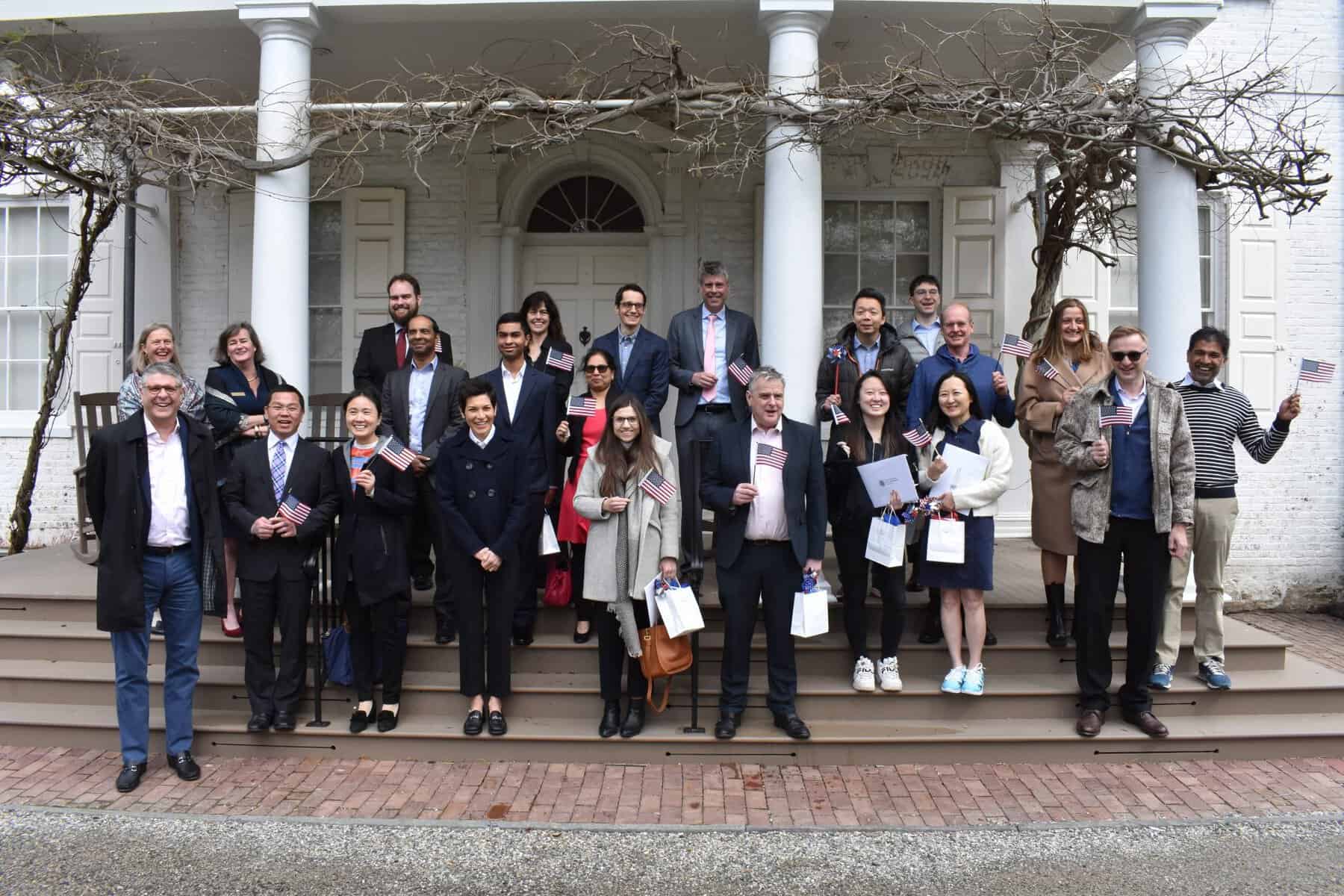As loved ones looked on, 20 Princeton residents became America’s newest citizens during a naturalization ceremony at the Morven Museum & Garden.
The naturalization ceremony, the first to occur at Morven, took place inside of the Stockton Education Center at the museum’s location at 55 Stockton St. in Princeton on April 19.
“Morven was delighted to host today’s ceremony,” said Jill Barry, executive director of the Morven Museum & Garden. “Our newest citizens act today was no less serious or dramatic than Richard Stockton leaving Morven to sign the Declaration of Independence nearly 250 years ago, swearing allegiance and willingness to defend our country’s bedrock ideals.”
Those in attendance stood at the beginning of the ceremony as the national anthem played and would watch a video called “Faces of America,” which highlighted America’s long history of immigration.
“I know this is a journey and you are thinking about so many things right now. You are thinking about that first time you came to your new country, family members, friends possibly left behind,” said Keith Dorr, U.S. Citizen and Immigration Services supervisor (USCIS). “You have earned this. This was not given to you.”
Dorr described the process to become an American citizen.
“The first thing you must do is establish legal residency in this country. It is one of the hardest things to do. You have to emigrate to the United States of America,” he said. “I know many of you probably waited for years for that visa to come to America, some of you came here on work visas, you did not have that green card yet. Then you had to wait for that company to sponsor you. Some of you came here as refugees and some of you met an American, came here and fell in love.”
After living in America for at least five years – or three years if married to an American citizen – people who emigrated to America technically qualify to become a naturalized citizen, Dorr said.
“There was no requirement to become a citizen. You can live your entire life in this country and never do this. You are here today by choice,” he said. “You filed an application with our agency and then patiently waited. Then you had an interview with one of the officers as they went over your application and life.”
A test was given and some had to prove their English proficiency.
“There is one more requirement that you must fulfill to become an American citizen. You must swear your allegiance and loyalty to your new country,” Dorr said. “If you are going to be citizen we need to be able to depend on you.”
At the ceremony, Dorr delivered the Oath of Allegiance to the 20 Princeton residents. Once completing the oath during the ceremony they were officially welcomed as newly-naturalized citizens.
After rising for and reciting the Pledge of Allegiance, one by one they received their naturalization certificates and a free membership to the Morven Museum & Garden for a year.
America’s newest citizens come from 11 countries: Australia, Canada, China, Hong Kong, India, Netherlands, Russia, Slovakia, South Africa, South Korea, and the United Kingdom.
USCIS Field Office Director Ya-Mei Chen closed the ceremony with a story of her own journey from Taiwan to becoming an American citizen.
“We study and study and we want to figure out a way to understand this country, the customs and try to fit in. But I do not want you to forget where you are from,” she said. “The country, the culture, the heritage you carry with you shaped who you are today. Do not forget that.”
Chen stressed that they continue to celebrate their culture, traditions and food.
“I want to thank you for just being you. Because of you and your unique talent you make this country the best country in the whole wide world,” she said.
Michal Kolesar, a professor of Economics at Princeton University, was one of the 20 new U.S. citizens following the ceremony. He said it was an emotional day.
“I first came to the United States in 2008 for graduate school, then later got married to [Elizabeth] here and now we have a family,” he said. “Raising a kid here I wanted to be a part of this country and I am really happy it all worked out.”
The opportunities the United States provides and the research universities available were the reasons Kolesar came to America from Slovakia.
“It has been wonderful living here. The naturalization itself was OK. It was the simplest step,” Kolesar said. “All steps before getting the first visa and break authorization was a lot of work for sure.”
Friedel Stairiker is from the Netherlands and found the day overwhelming.
“I’m very grateful. This is just a beautiful day. America is a beautiful country and I wanted to come because it is America,” she said. “In this journey I had the support of my children here and I have a son who could not be here today because he is in the military.”
Stairiker said she tried to keep it together once she finished the Oath of Allegiance.
“I am just so grateful to be a part of this country and that is the bottom line. I’m happy, excited, and proud to be an American citizen,” she added. “The process was a little nerve-wracking, but every time you got a step closer it was very exciting.”

